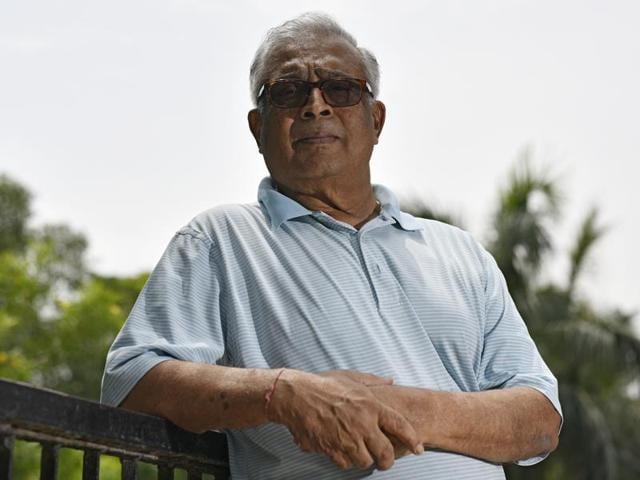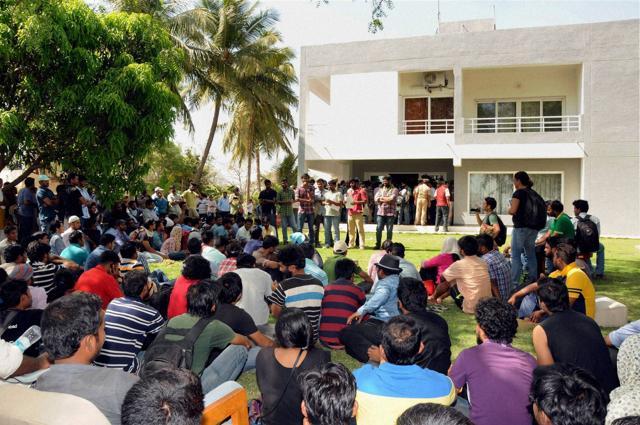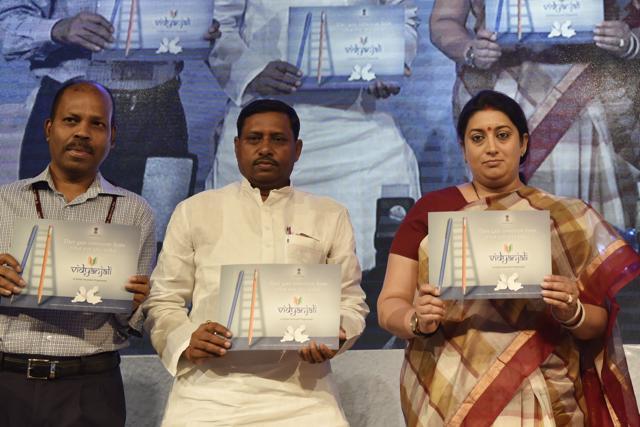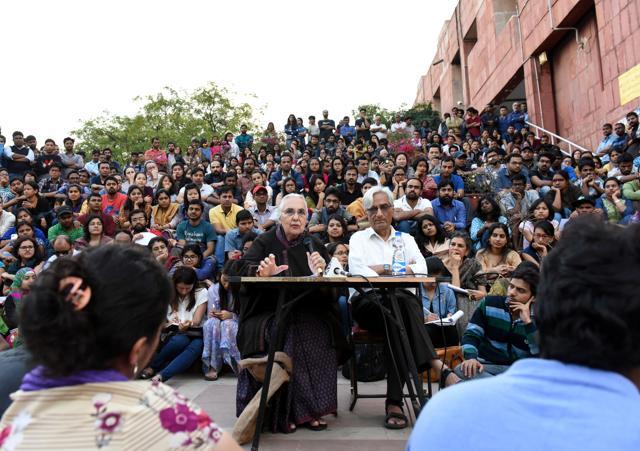What happened in Hyderabad (University) is the symptom: TSR Subramanian
An exclusive interview with TSR Subramanian, who led a committee established by the HRD ministry to come up with ideas for a new education policy.
In the eye of the storm over the radical policy changes recommended in education by his panel, TSR Subramanian is not one to mince words. He led a committee established by the HRD Ministry to come up with ideas for a new education policy. According to him, the brightest educators must be sifted from the non-performers instead of the current practice of treating them on a par, and students who fail to make the cut should be detained rather than lower overall class standards. Minority schools must also be covered in the RTE-mandated 25 per cent EWS quota ambit, Subramanian tells Neelam Pandey in an exclusive interview. Suggestions from all groups are welcome, he says, including RSS-backed ones. Excerpts:

There seem to be concerted efforts to curb students’ political activism on campus which by implication amounts to curbing freedom of expression of youth and snuffing out dissent.
I think the committee has obtained legal opinion. The opinion basically states that freedom of expression is a fundamental right. We have the right to form associations too. But there should be restriction to ensure that this right of a few should not impinge on the majority of the students. It is possible to have such restrictions.
The committee is saying that there should be a national debate. There are two needs; one is the constitutional need of giving the right to the people and the other is the right of other students to not be disturbed. Examinations and classes should not be disturbed.
The silent majority is generally not heard. What we hear is the people who are vocal and who are able to come to the press and media, so we are saying there should be national debate, how to balance the truth. For example, our legal opinion in the case of the Lyngdoh Committee report, which has been referred to the Supreme Court, has given that complete restriction should be there. The university is basically not for politics, the purpose of university is not politics, the purpose is to teach people. Therefore, a national debate should take place in the country.
Read: Universities deserved more from the new education policy
All that we are now saying is that the 95% people, their rights are getting affected. The court has defined the limit. For example they have said there should be no loudspeakers.
Everybody quotes the example of the USA, right now there is a huge debate going on in the US, but you have not heard of one class being disturbed, you never heard of stones being thrown. No right is unrestricted. The university is a temple for learning. It is not caste or community oriented. Basically all that is being said is the silent majority has the right to study.
Is the government scared about recent student agitations in JNU and HCU? Did that trigger the thought to banish student politics from campuses?
No. If I can say it was triggered by anything then [it was] my own experience in Kolkata where my examination was postponed by 1.5 years. My batch lost that due to agitations, unrest in the city – leftist agitation.
Today in Jadavpur [University] and in many states you find – exams are postponed, stone throwing etc takes place. The primary purpose of a university is to teach and to allow students to learn, and not to generate netas. We are not saying that don’t generate netas but we are saying you must create conditions that all that takes place within the campus doesn’t disrupt education.
What happened in Hyderabad is the symptom but we are talking about the disease. Caste, community, political activities – these are all national issues which permeate our society but education is pure. Yes, there will be caste angles, grace marks will be given, the poor versus rich will be there, but then if fights take place, 90% of students will suffer.
Hence, don’t disrupt the main purpose.

Is it also an extension of your fear of student politics and agitations that led to plans to put restrictions on the number of years a student can stay on campus?
If you see law colleges and many other universities, students study for eight years doing their PhDs and they become dadas. They start owning the university campus in different ways. But the campus belongs to all. We are saying that give them reasonable time to complete their work. If they can’t finish it ask them to study at home while doing their PhDs. But hostels etc should be restricted after a certain point.
The autonomy of minority institutions has been challenged in the draft. You have recommended that they should implement 25 per cent EWS quota. Do you think minority educational institutions are relying on their status to work around the provision to provide 25 per cent quota to the economically-backward?
As per the present SC judgment regarding 12 (1)(c) which makes it mandatory for educational institutes to reserve 25 per cent for Economically Weaker Sections, linguistic and communal minorities are exempted. However, we feel no, why should they be exempted?
The present 25 per cent mixture in schools doesn’t say it is for one particular caste or community. We have said that either we should go to SC and get a new law or ask them to review the exemption that has been provided to the minority institutes. We have heard that a number of new minority institutions have sprung up in the last four years only to avoid reserving 25 per cent for economically weaker sections. We reiterate that 25 per cent reservation should remain and the working problems in implementing it should be addressed.
There is article 12 (1) (c) of the Right to Education Act under which 25 per cent belonging to the backward sections of the society and economically weaker sections should be admitted in every school. The purpose of the minority schools is for linguistic or for caste minorities to educate their people. But it doesn’t say 25 per cent can’t be there. We are now seeing repeatedly that English language schools etc have all come up on linguistic minority wicket, only to beat this.
We are also saying that we have to balance two or three different kind of rights here, linguistic, minority rights, rights of the poor people to have access to education. Don’t forget 25 per cent are also Indian citizens. They are also from the deprived class, economically and socially. How can you say that linguistic minority has superior claim to the Constitution?
Read: Saffronisation of education will happen if it helps India: Smriti Irani’s deputy
There have been loud, often controversial suggestions from the RSS-affiliated outfits with the larger aim of saffronising education. How do you view them considering the RSS is the ideological fountainhead of the ruling dispensation now? There are widespread fears expressed from various quarters that there are deliberate efforts at saffronisation of educational curricula—all the more intense in the context of minority institutions.
We have had many views, extreme views from all sides, for instance, ban totally private schools.
The government should regulate everything. We brought a median everywhere. We have heard everyone.
There are three- four of values: Work ethics, personal behaviour, not being rude to elders, gender equality etc. There are universal values that every religion teaches – ahmisa, do good to others etc. We have suggested that in middle school, basic religion of all religions should be taught. So we are not talking about saffronisation but are talking about human values and have listed them and said that they should be there in the curriculum.
As far as nation-building is concerned, we have asked how you can give rather than take. How you only think about your rights under the Constitution or the community. Focus on your duties too.
In a value system, discipline should be taught. If the left says that and if we put it in our report, the report doesn’t become leftist.

There is a huge amount of money and political influence in play in various aspects of education including teachers’ recruitment. Will it continue to remain a fact of life in the country?
We feel that we forget that the quality of the Indian child is very high. Quality is there but the question is of opportunity. The teacher has to teach. The school and the teacher and the student are the kingpins of the matrix. Somehow in our mind it is the minister, secretary who are the key players. We need to understand those are not the bosses or the kings but only the facilitators.
For instance, in teacher recruitment today we think how to make money out of it, when it comes to promote a principal, we think how to make money out of it. We need to make the system transparent, everyone should know what the process is. For instance, the transfer policy [of teachers] is published in many states and anyone can go and say you are not following it.
Under the Right to Education Act, a student cannot be detained till Class 8. You have suggested that this should not be a law. Why?
See, if you look at the principle – no-detention policy – it’s a good principle which means we assume that every child has the ability to learn. In western countries, they have put obligations on the teachers that there should be no detention. Unfortunately, in Indian conditions we can’t apply western concepts blindly.
While in principle no detention is good, in practice we have found in the last 10 years that there are many difficulties. The idea is that children learn at a different pace so don’t penalize the child, the coaching standards are very bad so don’t penalize the child, thirdly, the examination, because the child has failed in one subject, they have to repeat the class. These are the arguments for no-detention.
But there are similar arguments for detention too, as in if they aren’t detained, the child loses interest, the teacher loses interest, coaching standards have to come down sharply to meet their level.
Read: Education policy: Panel wants RTE Act amended, area-specific guidelines
So in principle it is good but in practice it has to be applied with a lot of caution because we have said that it demotivates teachers, it is loaded in favour of the worst in the class but doesn’t give much to the best in class. So 80% of the students are not the focus of the teachers and therefore it is regressive.
The solution is not that you blindly detain. We have now said that you must have a strong in-built remedial coaching system in the school, only those bottom 20% will come and study on extra days.
In rural areas, in one year of drought a child can lose six months and attendance gets affected – give them three extra chances – not in terms of examination but remedial coaching – use of technology – at worst when nothing else succeeds – the student will hit the wall and will damage other students. Hence, no detention cannot be a law but in rare cases it should be applied. We have said that up to class 5 there shouldn’t be detention but after that it is possible though in rare cases.
Despite various efforts, teaching standards remain mostly pathetic across the country. Is it something that is set to change now in any way?
Three years from now every child should be measured every year and every child is linked to the teacher and the teacher is measured according to their performance.
Today, the Gadha and the Ghoda teacher is the same today – how do we distinguish between a good and bad teacher? You bring in new norms to assess teachers, measure teacher performance through student learning outcome, performance. Then after all that if the child fails, link [the student] with vocational [studies] – so that he doesn’t drop out.
If everything else fails then don’t punish 90% of the students to save one child.

How feasible is the proposed all-India examination for common admissions under a SAT-like pattern in India, where people are used to a multitude of entrance examinations?
In rural areas there are many people who learn at home. Also, children, for various reasons – it could be economic which is particularly true of SC/ST socially and economically backward classes – drop out. So that child should not be left out of the system. If the child is smart give him an outside chance to enter the higher educational stream through an examination.
For instance, in American universities, the SAT exam score is used for admission to all. Even those who self-educate themselves – give an avenue to them and recognize it through a high-quality exam. The examination should be credible and tough – meant not for normal students but for those who have dropped out of the system due to domestic tragedy, no earning member etc. The score should be used for admission to universities etc.
That is like putting the state boards in a disadvantageous position...
Many state boards are not uniform in quality while CBSE has a higher quality overall.
The all-India exam that I spoke about will establish an all-India quality. Currently, a student has to give several entrance exams for engineering and technical colleges. We have proposed that for each discipline there should be only one exam. States will be able to have a quota system for their students and they will also have to accommodate those who give the all-India exam.
How long will it take before India gets a body, not filled with the usual suspects, which would make recommendations for a qualitative difference to education in the country?
The last education policy was 30 years back. It is too important a subject to be reviewed in 30 years. There should be a standing body. As education standards all over are different, we need a non-executive thinking body of experts who are knowledgeable and who will sit and deliberate and give advice to government on take it or leave it basis. Also, a state of education report should be published.
What’s your take on the apparent spat with HRD minister Smriti Irani [Subramanian had threatened the HRD ministry to make the report public if they didn’t]?
My view is that it’s not worth pursuing. Hopefully they are following a procedure by which they will bring out the policy. The issue is not what I said and what they said. It’s not important.
No emphasis on art and culture and humanities in the policy...
Nobody is stopping them, every good university should have it, and policy doesn’t say you should not have this. Today there is no shortage of institutions for art courses, the problem comes in medical etc. There are no entrance examinations for art courses; we are addressing the examination system which is there for engineering and medical. Total freedom is given to higher education.
[The interview has been edited for brevity and clarity.]
Get Current Updates on India News, Lok Sabha election 2024 live, Election 2024 along with Latest News and Top Headlines from India and around the world.




